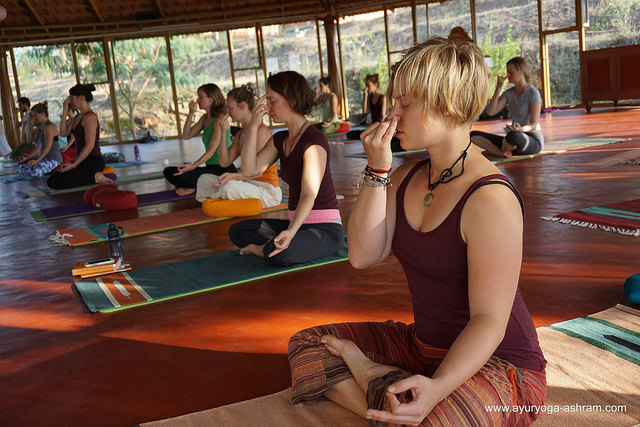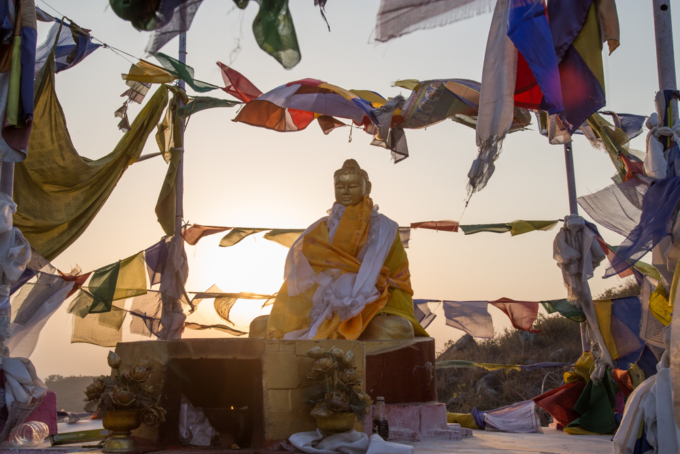spiritaual selfdevelopment against climate change? this has nothing to do with each other you might say. but actually it is connected! different representative of the world religions are talking about the state of the world in the media. for example papst franziskus with his much discussed enzyklika laudato si´ or the videomessage of the dalai lama before paris climate agreement 2016. all point out the causes of this climate crisis we have to face clearly and call out for a change of society to safe the creation of the universe.
if we look at the problem from a religious point of view of course we can not unload all responsibillity on god, budha, shiva or allah and ask for forgiveness. there is no greater figure liable for this situation, but the role of religion as a leader is clearly there. the worldwide eco-social change would not be the same without religious role models like mahatma gandhi or thich nhat hanh. and everyday the help organizations from the catholic church, social involved buddhism or free communities are involved to make a change in this world.
the last few month i spend my time on a spiritual research in india. i did not explicitly join any religion group or sect, but i deepened my practise in yoga and meditation. what i found out while practicing yoga every day 2 hours in the morning for one month and sitting in silence in a vipassana meditation for 10 hour for 10 day is: the outside world can be changed only by changing the inside world first. we can not blame anyone for his or her behavior before we have looked at ourself. reflect and understand our own actions and reactions and clear out habbits and confusion. the best way to do so is spiritual practise. taking time for oneself to reflect and meditate for me is the key.

after that surely we can understand also our outside world better. then we can see things from a different angle, understand why someone acts like this or that, how we can relate to it and develop compassion and insight.
who thinks about solar power, ecological farming, biodiversity and fair trade, not only sees figures and numbers of co2 and dollars, but also emotions, values and a vision of society. it is about sense. maybe you can say spirituality is the search of sense and meaning in this chaotic world.
it is necessary to find orientation and clarity rather than facts. it is important to talk about values and put the discourse of climate change in a bigger picture. to save our environment is to develop deep love and compassion.
there is no call for cost optimization or resource efficiency, but a need of integrity of natrual and human world. human beings don´t have the right to own the planet. there are birds, ants, monkeys, trees, plants and all kinds of living beeings who have the same right to exist on earth. even desserts and oceans. in the buddhist tradition the whole universe is the creation of god. nature has soul and humans are a part of this living cosmos.
in order to move our awareness to climate change and saving mother earth we need to develop a new consciousness that respects natural values and honors nature and other species. it is time to restore a new sense of sacredness of the cosmos. every being is important and valuable. it is about affirmation of human dignity and celebration of unity and equality. to find new models of community living and intersubjective solidarity in harmony with the cosmos. there is only advantage in building community. a universal ethic is not dogmatic, but includes the natural human tendency to goodness, kindness, love and sympathy. religious, national and race differences are secondary. we are all one.

furthermore, every religion includes asceticism, not for self mortification but to get to inner freedom. to free oneself from the unimportant and decrease greed. this request of simplicity is another connection between spirituality and climate change. to act against the more and more philosophy of consumerism as a solution against exploitation of resources, but also as a expression of justice. the ideal of equal access to resources and similar life quality for all can not be fulfilled if the wealthy of this society don´t start reducing their demand of resources of the planet. to share the wealth is the conclusion and rediscovering aesthetic and intellectual values is the conclusion. as the buddhist teachings say: seeking for higher consciousness beyond greed and fear. the balance between abundance and shortage. we cant just make every of our actions, buy organic and wear fair trade cloth. we surely need to reduce the demand of energy and resources in the first place. we need certainly material possession to be satisfied but beyond that point which is surprisingly low, it is actually less about what we have, but more about more about the way we live and the way we treat others, the way we feel ourselves and how to be in relationship with the wider world.



